公共英语三级知识点(部分)
全国公共英语三级考试笔记(简要版)

全国公共英语三级考试笔记(简要版)全国公共英语等级考试三级(PETS3)笔记第1部分Unit 1 Greeting and introuductionDialogues /monologues:1、You can tell they lived during the Depression.这里的"tell"是断定的意思,咳……常常把它的意思与(告知、告诉)联系在一起,脑子便转不过弯来。
此句意思应该是:你可以断定他们生活在那时的大萧条期。
2、He really knows how to bring a person out."bring a person out."是“鼓励一个人的”的意思。
整句话的意思是:他非常善于鼓励别人/使别人振作起来。
PS:to bring sb. out意思为:to make someone feel more comfident, happy, and friendly /使某人更加自信、开朗3、he looks like his fun to be with.整句话的意思是:他看起来是个很有意思的人。
或,和他在一起应该会很有意思。
句子解析4、since we're going to recruit some staff so that we can get our new school going in time。
这里的since, 和so that 是基于...原因的意思.根据意思我将其译成: 届时...将...以便...整句话的意思是:届时我们将聘请一些工作人员以便使我们的新学校及时开学.5、Would you address character description for the commercial and industrial arts staff?arts staff 怎么翻译?==>你能够给商业与工艺美术的职员讲讲特征描述吗?arts跟前面的commercial and indutrial连在一起看,而非与后面的staff:(the commercial and industrial arts) staff.6、There are a number of other positions to consider."A number of" 换成"a lot of" 或者是”a great many”行不行,为什么?==>可以换成a lot of或a great many of,因为position 是可数名词。
公共英语三级语法知识汇总
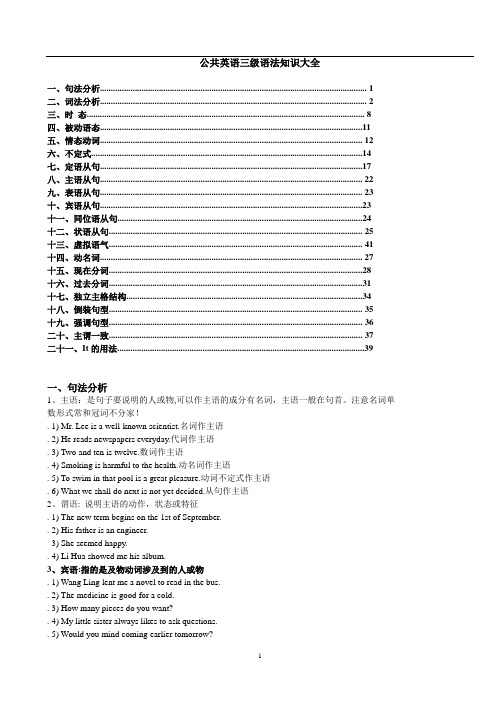
公共英语三级语法知识大全一、句法分析 (1)二、词法分析 (2)三、时态 (8)四、被动语态 (11)五、情态动词 (12)六、不定式 (14)七、定语从句 (17)八、主语从句 (22)九、表语从句 (23)十、宾语从句 (23)十一、同位语从句 (24)十二、状语从句 (25)十三、虚拟语气 (41)十四、动名词 (27)十五、现在分词 (28)十六、过去分词 (31)十七、独立主格结构 (34)十八、倒装句型 (35)十九、强调句型 (36)二十、主谓一致 (37)二十一、It的用法 (39)一、句法分析1、主语:是句子要说明的人或物,可以作主语的成分有名词,主语一般在句首。
注意名词单数形式常和冠词不分家!. 1) Mr. Lee is a well-known scientist.名词作主语. 2) He reads newspapers everyday.代词作主语. 3) Two and ten is twelve.数词作主语. 4) Smoking is harmful to the health.动名词作主语. 5) To swim in that pool is a great pleasure.动词不定式作主语. 6) What we shall do next is not yet decided.从句作主语2、谓语: 说明主语的动作,状态或特征. 1) The new term begins on the 1st of September.. 2) His father is an engineer.3) She seemed happy.. 4) Li Hua showed me his album.3、宾语:指的是及物动词涉及到的人或物. 1) Wang Ling lent me a novel to read in the bus.. 2) The medicine is good for a cold.. 3) How many pieces do you want?. 4) My little sister always likes to ask questions.. 5) Would you mind coming earlier tomorrow?. 6) He asked me what I was going to do tonight4、宾语补足语:在宾语后面补充说明宾语的动作、状态、特征。
公共英语三级语法知识汇总

公共英语三级语法知识大全一、句法分析 (1)二、词法分析 (2)三、时态 (8)四、被动语态 (11)五、情态动词 (12)六、不定式 (14)七、定语从句 (17)八、主语从句 (22)九、表语从句 (23)十、宾语从句 (23)十一、同位语从句 (24)十二、状语从句 (25)十三、虚拟语气 (41)十四、动名词 (27)十五、现在分词 (28)十六、过去分词 (31)十七、独立主格结构 (34)十八、倒装句型 (35)十九、强调句型 (36)二十、主谓一致 (37)二十一、It的用法 (39)一、句法分析1、主语:是句子要说明的人或物,可以作主语的成分有名词,主语一般在句首。
注意名词单数形式常和冠词不分家!. 1) Mr. Lee is a well-known scientist.名词作主语. 2) He reads newspapers everyday.代词作主语. 3) Two and ten is twelve.数词作主语. 4) Smoking is harmful to the health.动名词作主语. 5) To swim in that pool is a great pleasure.动词不定式作主语. 6) What we shall do next is not yet decided.从句作主语2、谓语: 说明主语的动作,状态或特征. 1) The new term begins on the 1st of September.. 2) His father is an engineer.3) She seemed happy.. 4) Li Hua showed me his album.3、宾语:指的是及物动词涉及到的人或物. 1) Wang Ling lent me a novel to read in the bus.. 2) The medicine is good for a cold.. 3) How many pieces do you want?. 4) My little sister always likes to ask questions.. 5) Would you mind coming earlier tomorrow?. 6) He asked me what I was going to do tonight4、宾语补足语:在宾语后面补充说明宾语的动作、状态、特征。
公共英语三级复习必背重点词汇
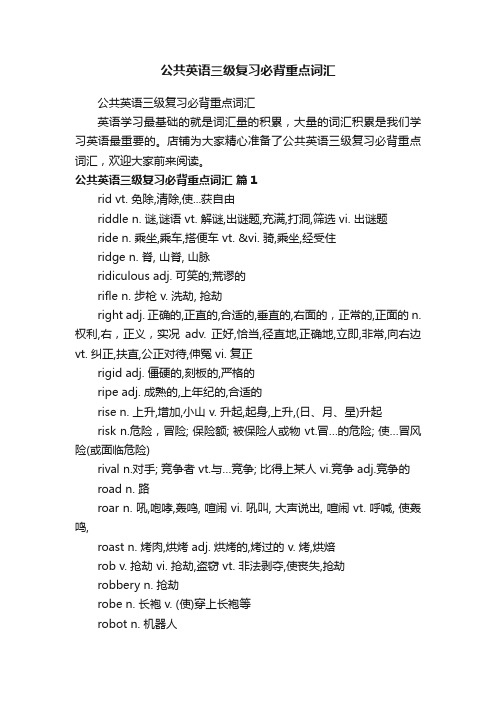
公共英语三级复习必背重点词汇公共英语三级复习必背重点词汇英语学习最基础的就是词汇量的积累,大量的词汇积累是我们学习英语最重要的。
店铺为大家精心准备了公共英语三级复习必背重点词汇,欢迎大家前来阅读。
公共英语三级复习必背重点词汇篇1rid vt. 免除,清除,使...获自由riddle n. 谜,谜语 vt. 解谜,出谜题,充满,打洞,筛选 vi. 出谜题ride n. 乘坐,乘车,搭便车 vt. &vi. 骑,乘坐,经受住ridge n. 脊, 山脊, 山脉ridiculous adj. 可笑的;荒谬的rifle n. 步枪 v. 洗劫, 抢劫right adj. 正确的,正直的,合适的,垂直的,右面的,正常的,正面的 n. 权利,右,正义,实况adv. 正好,恰当,径直地,正确地,立即,非常,向右边vt. 纠正,扶直,公正对待,伸冤 vi. 复正rigid adj. 僵硬的,刻板的,严格的ripe adj. 成熟的,上年纪的,合适的rise n. 上升,增加,小山 v. 升起,起身,上升,(日、月、星)升起risk n.危险,冒险; 保险额; 被保险人或物 vt.冒…的危险; 使…冒风险(或面临危险)rival n.对手; 竞争者 vt.与…竞争; 比得上某人 vi.竞争 adj.竞争的road n. 路roar n. 吼,咆哮,轰鸣, 喧闹 vi. 吼叫, 大声说出, 喧闹 vt. 呼喊, 使轰鸣,roast n. 烤肉,烘烤 adj. 烘烤的,烤过的 v. 烤,烘焙rob v. 抢劫 vi. 抢劫,盗窃 vt. 非法剥夺,使丧失,抢劫robbery n. 抢劫robe n. 长袍 v. (使)穿上长袍等robot n. 机器人relative adj. 相对的,比较的,涉及到的 n. 亲属,同类事物,相关物relax vi. 放松,松懈,松弛 vt. 放松,放宽(限制等)relay vt. 中继,用继电器控制,接替,传递 n. 替班人,接力赛,继电器,传递release n. 释放, 让渡, 发行 vt. 释放, 让与, 准予发表, 发射relevant adj. 相关的, 切题的, 中肯的reliable adj. 可靠的,可信的relief n.宽慰,安心; 免除,减轻; 救援物资; 代班人relieve vt. 减轻,救济,解除religion n. 宗教;宗教信仰religious adj. 宗教的,虔诚的,细心的 n. 修道院成员, 僧侣reluctant adj. 不情愿的,勉强的remain v. 保持, 依然, 剩余, 留下, 逗留 n. 遗迹, 剩余物, 残骸remainder n. 剩余物, 其他的人, 残余 vt. 廉价出售 adj. 剩余的` remark n. 备注,评论,注意 vt. 评论,注意,述及remarkable adj. 显著的, 异常的, 非凡的, 值得注意的remedy n. 药物,治疗法,补救 vt. 治疗,补救,矫正remember vt. &vi. 记得,记忆remind v. 提醒 vt. 使想起,提醒remote adj. 偏僻的,遥远的,远程的,(感情等)距离很大 n. 远程操作remove n. 间距, 移动 vt. 除去,开除, 移动, 取下, 拿走 vi. 迁徙,离开,搬迁公共英语三级复习必背重点词汇篇2托业英语电脑类词汇1.activate使活动;触发;激活2.browse浏览;随便翻阅mand指令;命令;掌握4.configuration结构;构造;配置5.database数据库6.desktop桌上型的7.downgrade降级;使降职8.floppy(disk)软盘9.hyperlink超链接10.install安装;安置11.know-how技能;专业知识;窍门12.modern调制解调器13.omit忽略;删除;疏忽14.scanner扫描仪托业科技及设备英语词汇1.automaton自动操作装置;机器人2.cell(ular)phone移动电话;手机3.consecutive连续的;连贯的4.devise设计;发明;策划5.equipment装备;设备6.facility便利的设施;设备7.gadget小巧的机械装置;小玩意8.hands-on实地操作的;亲身体验的9.inspect检查;审查;视察boratory实验室11.maintenance维护;保养12.manual使用手册,指南;手工的work 网络系统;广播、电视网;电脑网14.outage电力中断;断电托业商务会议及谈判词汇1、adjourn暂时;休会;延期2、agreement同意;协定3、amendment修正4、approval赞成;同意5、attentive注意的;留心的专心的6、board理事会;委员会;董事会7、brainstorm脑力激荡,集思广益8、concede容忍;容许;让步9、conference会议;协商;讨论会10、convention惯例;常会议;大会11、convince使信服12、cross-reference前后参照;(使)前后参照13、delegate代表14、demand要求;强求。
公共英语三级笔记(unit1)

公共英语三级语言点整理Unit 1 Greeting and IntroductionDialogue/Monologue 1一、语言点1、I’m sure you recognize Grandmother in this picture? She’s in the blue dress.I’m sure 后省略了that,引导宾语从句you recognize....In this picture在这张照片里;in the blue dress 穿着蓝色裙子;这是介词in的一种用法,后面加颜色和服装表示“穿着...”比如:in the red coat 穿着红色外套;in the purple pants 穿着紫色裤子;此外,in the blue dress = wearing the blue dress2、who’s that holding the hand of a boy?holding the hand of a boy在这里是现在分词充当定语,修饰that(那个人);翻译为“握着一个男孩手的那个人”3、Nick, when he was two years old. 这里的when 翻译为“那时候,当时”4、sister-in-law 字面意思为法律意义上的姐妹,实际是指因为婚姻而形成的姐妹→“嫂子”或者“弟妹”;同类词还有father-in-law 岳父、公公;mother-in-law 岳母、婆婆等等;5、be next to sb 在某人的旁边;比如:Who is the man that is next to Mary? 玛丽旁边的那个男士是谁呢?6、be angry with sb 对某人生气be angry at sth 对某事生气7、Lester always leaves her and goes out of town on business.这里的leave这个动词的用法简单归纳如下:1)“leave+地点”表示“离开某地”。
公共英语三级知识点
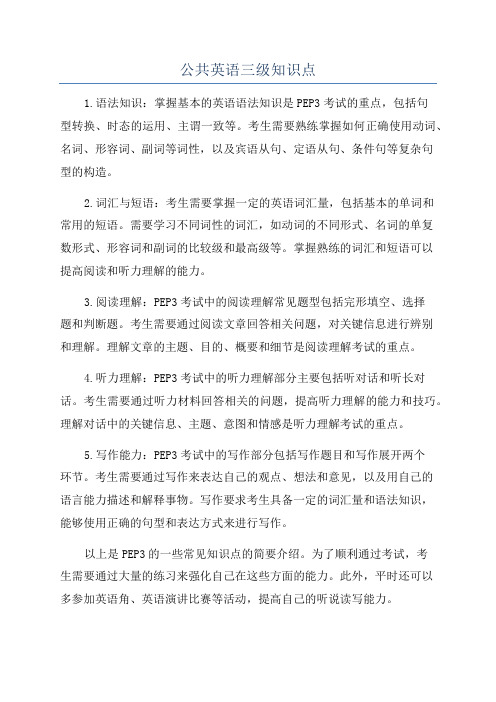
公共英语三级知识点
1.语法知识:掌握基本的英语语法知识是PEP3考试的重点,包括句
型转换、时态的运用、主谓一致等。
考生需要熟练掌握如何正确使用动词、名词、形容词、副词等词性,以及宾语从句、定语从句、条件句等复杂句
型的构造。
2.词汇与短语:考生需要掌握一定的英语词汇量,包括基本的单词和
常用的短语。
需要学习不同词性的词汇,如动词的不同形式、名词的单复
数形式、形容词和副词的比较级和最高级等。
掌握熟练的词汇和短语可以
提高阅读和听力理解的能力。
3.阅读理解:PEP3考试中的阅读理解常见题型包括完形填空、选择
题和判断题。
考生需要通过阅读文章回答相关问题,对关键信息进行辨别
和理解。
理解文章的主题、目的、概要和细节是阅读理解考试的重点。
4.听力理解:PEP3考试中的听力理解部分主要包括听对话和听长对话。
考生需要通过听力材料回答相关的问题,提高听力理解的能力和技巧。
理解对话中的关键信息、主题、意图和情感是听力理解考试的重点。
5.写作能力:PEP3考试中的写作部分包括写作题目和写作展开两个
环节。
考生需要通过写作来表达自己的观点、想法和意见,以及用自己的
语言能力描述和解释事物。
写作要求考生具备一定的词汇量和语法知识,
能够使用正确的句型和表达方式来进行写作。
以上是PEP3的一些常见知识点的简要介绍。
为了顺利通过考试,考
生需要通过大量的练习来强化自己在这些方面的能力。
此外,平时还可以
多参加英语角、英语演讲比赛等活动,提高自己的听说读写能力。
最全公共英语等级考试三级大纲词结
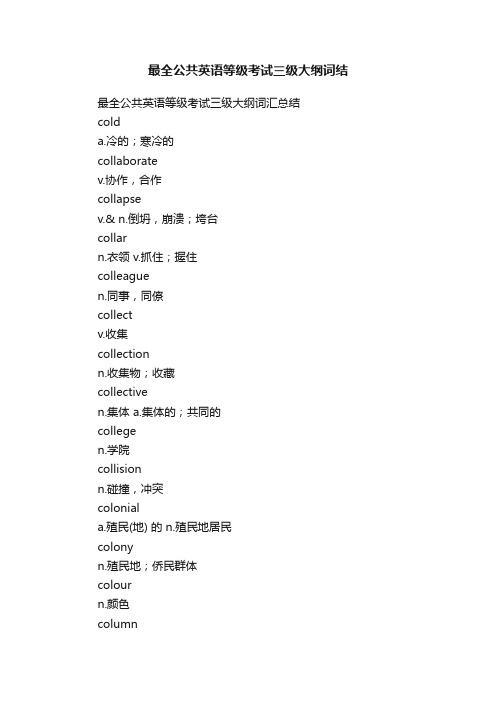
最全公共英语等级考试三级大纲词结最全公共英语等级考试三级大纲词汇总结colda.冷的;寒冷的collaboratev.协作,合作collapsev.& n.倒坍,崩溃;垮台collarn.衣领 v.抓住;握住colleaguen.同事,同僚collectv.收集collectionn.收集物;收藏collectiven.集体 a.集体的;共同的collegen.学院collisionn.碰撞,冲突coloniala.殖民(地) 的 n.殖民地居民colonyn.殖民地;侨民群体colourn.颜色columnn.圆柱,柱;列;(报刊中的) 专栏combn.梳子 v.梳理combatv.& n.战斗,反对,格斗combinationn.结合,联合,合并;化合(物)combinev.(with)(使) 结合,联合;(使) 化合comev.来comedyn.喜剧;喜剧性事件comfortn.安慰;舒适 v.使舒适;安慰comfortablea.舒适的,舒服的commandn.命令,指令;统帅,指挥(权) v.命令;指挥commendv.表扬,称赞;推荐;委托commentn.注释;,评论,意见 v.(on) 注释;评论commercen.商业,贸易commerciala.商业的,贸易的 n.(广播或电视上推销商品的)商业广告节目commissionn.委员会;委任,委托(书),代办;佣金,手续费commitv. 把…交托给;犯错误,干坏事committeen.委员会commodityn.商品,物品commona.共同的commonwealthn.共和国,联邦,共同体communicatevi.交流 vt.传染;传播communicationn.交流,联系;交通communismn.共产主义communistn.共产主义者,共产党人 a.共产主义的;共产党的communityn.社会,社区;共同体;公众commutev.乘车(或船等) 往返于两地companionn.伴侣,同伴,志趣相投的人companyn.公司comparablea.(with, to) 比得上的,相似的comparativea.比较的,相当的 n.匹敌物;比较级comparev.比较,对照comparisonn.比较,对照;比拟compartmentn.卧车包房,(客车厢内的) 隔间;分隔的空间;水密舱compassn.罗盘,指南针;(pl.) 圆规;(正式) 范围compelv.强迫,迫使compensatev.(for) 补偿,赔偿compensationn.补偿,赔偿competev.比赛;竞争competenta.有能力的,胜任的;应该做的,被许可的;足够的;有法定资格的competitionn.竞赛,竞争competitorn.竞争者,敌手complainv.抱怨;申诉complaintn.抱怨;申诉;疾病complementv.补充,补足民补足 n.补充;补语completea.完整的,完全的;完成的 v.完成,使完整complexa.复杂的;合成的,综合的 n.复杂;联合体complicatev.(使) 变复杂complicateda.错综复杂的,麻烦的',难解的complimentn.(pl.) 问候,致意;称赞,恭维 v.称赞,恭维complyv.遵照,应允componentn.组成部分,成分,元件 a.组成的,合成的composev.组成,构成;创作(作曲、诗歌等)compositionn.作文,写作;乐曲;构成,组成,结构compoundn.混合物,化合物a.混合的,化合的,复合的v.使复合,使混合;和解,妥comprehendv.理解;包含comprehensionn.理解comprehensivea.内容广泛的,综合的;理解的compressv.压缩,浓缩comprisev.包含,构成compromisev.妥协;折衷compulsorya.强制的,义务的,必修的computen.计算,估计computern.计算机comraden.,同事concealv.隐藏,隐瞒;隐蔽concentratev.(on) 集中,专心;浓缩 n.浓缩物conceptn.概念,观念;思想concernv.涉及,关系到;(使) 担心,(使) 关切 n.关心,挂念;(利害) 关系concerningprep.关于concertn.音乐会,演奏会;一齐,一致concessionn.迁就,让步concisea.简明的,简洁的concludev.结束,终止;断定,下结论;缔结,议定conclusionn.结束,终结;结论,推论concretea.具体的,实质性的 n.混凝土;具体物 v.浇混凝土。
三级公共英语语法重点

• would rather+从句,是一个常用的虚拟语 气句型 Would rather+从句,谓语一般用过去 时来表示现在或将来。其意为“宁愿……, 还是…… 好些”“一个人宁愿另一个人做 某事”。引导从句的that常省略。在谈到过 去的动作时,谓语则用过去完成时。
• John wants to see me today. I would rather he came to tomorrow than today. 约 翰今天想去看我。我宁愿他明天来看我而 不是今天。(句中came不是表示过去而是表 示将来)
• No sooner …than 刚一…就 • We had no sooner sat down than we found it was time to go. • No sooner had we sat down than we found it was time to go.
• Now that : since • Now that you are grown up, you must stop this childish behavior. • So… as 像…一样 否定句 • This room is not so large as that one. • So far as 就… • So far as I know, he will be away for three we名词+but also +名词 名词+but +名词
• Not only… + 名词+but also +名词作主语的 结构中,谓语动词与but also 后的名词的数 保持一致。 • Not only his wife but also his children have arrived.
公共英语三级知识点汇总
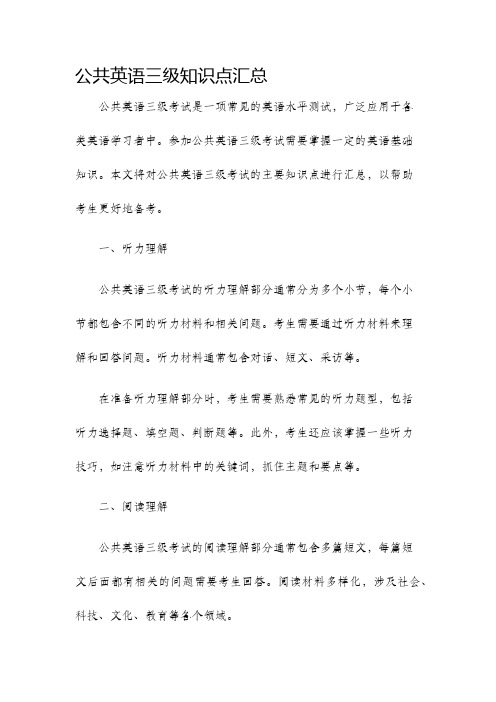
公共英语三级知识点汇总公共英语三级考试是一项常见的英语水平测试,广泛应用于各类英语学习者中。
参加公共英语三级考试需要掌握一定的英语基础知识。
本文将对公共英语三级考试的主要知识点进行汇总,以帮助考生更好地备考。
一、听力理解公共英语三级考试的听力理解部分通常分为多个小节,每个小节都包含不同的听力材料和相关问题。
考生需要通过听力材料来理解和回答问题。
听力材料通常包含对话、短文、采访等。
在准备听力理解部分时,考生需要熟悉常见的听力题型,包括听力选择题、填空题、判断题等。
此外,考生还应该掌握一些听力技巧,如注意听力材料中的关键词,抓住主题和要点等。
二、阅读理解公共英语三级考试的阅读理解部分通常包含多篇短文,每篇短文后面都有相关的问题需要考生回答。
阅读材料多样化,涉及社会、科技、文化、教育等各个领域。
在准备阅读理解部分时,考生需要提前积累一定的词汇量,并掌握常见的阅读题型,如选择题、填空题、判断题等。
同时,考生还应该注重提高阅读速度和阅读理解能力,培养快速获取信息的能力。
三、写作公共英语三级考试的写作部分要求考生根据所给提示或图表,完成一篇短文写作。
写作主题一般与生活、教育、环境、科技等相关。
在准备写作部分时,考生需要了解一些常见的写作结构和表达方式,如起承转合、使用连词、使用举例等。
此外,还要提高自己的写作能力,包括提炼关键信息、组织语言、合理运用语法和拼写等。
四、口语公共英语三级考试的口语部分通常包含问答和对话两个环节。
考生需要正确回答问题或参与对话,展示自己的口语交流能力。
在准备口语部分时,考生需要扩大词汇量,提高听说能力。
还可以通过模拟口语考试,进行练习和训练。
同时,要注意流利地使用语法和语音,提升口语表达的准确性和自然度。
五、词汇与语法公共英语三级考试对词汇与语法的要求相对较高。
考生需要掌握常见的词汇和短语,了解常见的语法知识,如时态、虚拟语气、从句等。
在准备词汇与语法部分时,考生可以通过背单词和短语,以及进行语法习题训练来提高自己的词汇和语法水平。
公共英语三级知识点

公共英语三级知识点
听力:
1.听力材料主要涵盖日常生活、学习、工作等方面的话题,考察考生
对英语口语的理解和应用能力。
2.侧重听取关键信息,如人名、时间、地点等。
3.需要注意听力材料中的细节信息,如数字、日期、价格等。
阅读理解:
1.阅读材料包括广告、公告、传单、邮件、新闻报道、简报等。
2.要求考生根据阅读材料回答相关问题,包括细节理解、态度、目的、观点等。
3.学会在有限的时间内快速捕捉文章的主旨和关键信息。
写作:
1.写作分为应试文体和实用文体。
2.应试文体主要包括日记、便条、短信、文章概要等。
要求考生掌握
一定的写作格式和文章结构。
3.实用文体主要包括求职信、商务信函、邀请函、感谢信等。
要求考
生在语言表达和格式方面更为正式和专业。
口语:
1.考试形式包括单项选择和会话,以日常生活和工作话题为主。
2.面试时考官会给出一个问题或情景,并要求考生用英语回答或进行
对话。
3.考察考生的流利度、口语表达能力、正确运用语法和词汇的能力。
其他知识点:
1.语法:掌握基本的语法知识和用法,包括动词时态、语态,名词、
代词、形容词、副词的使用等。
2.词汇:积累常用词汇,包括日常生活、工作、学习等方面的词汇。
3.句型:掌握常用句型和表达方式,如祈使句、感叹句、条件句、宾
语从句等。
最后,公共英语三级考试需要考生具备一定的英语语言基础和应用能力。
通过充分准备和练习,掌握考试内容和技巧,可以提高考试的成功率。
公共英语三级知识点(部分)
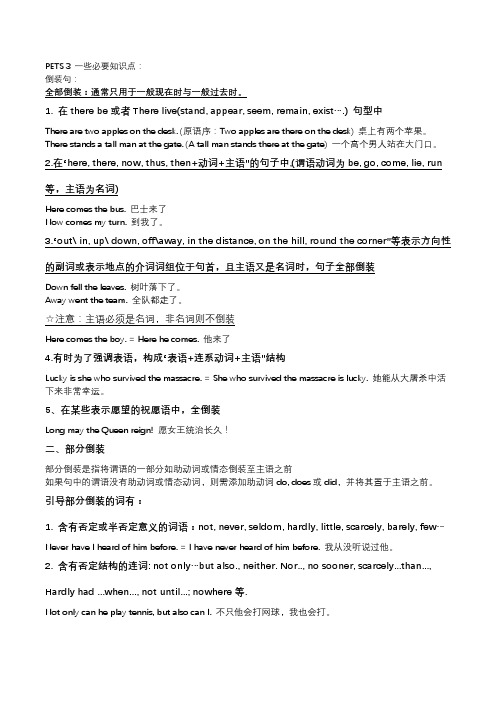
PETS 3 一些必要知识点:倒装句:全部倒装:通常只用于一般现在时与一般过去时。
1. 在there be或者There live(stand, appear, seem, remain, exist….) 句型中There are two apples on the desk. (原语序:Two apples are there on the desk) 桌上有两个苹果。
There stands a tall man at the gate. (A tall man stands there at the gate) 一个高个男人站在大门口。
2.在“here, there, now, thus, then+动词+主语”的句子中,(谓语动词为be, go, come, lie, run等,主语为名词)Here comes the bus. 巴士来了Now comes my turn. 到我了。
3.“out\ in, up\ down, off\away, in the distance, on the hill, round the corner”等表示方向性的副词或表示地点的介词词组位于句首,且主语又是名词时,句子全部倒装Down fell the leaves. 树叶落下了。
Away went the team. 全队都走了。
☆注意:主语必须是名词,非名词则不倒装Here comes the boy. = Here he comes. 他来了4.有时为了强调表语,构成“表语+连系动词+主语”结构Lucky is she who survived the massacre. = She who survived the massacre is lucky. 她能从大屠杀中活下来非常幸运。
5、在某些表示愿望的祝愿语中,全倒装Long may the Queen reign! 愿女王统治长久!二、部分倒装部分倒装是指将谓语的一部分如助动词或情态倒装至主语之前如果句中的谓语没有助动词或情态动词,则需添加助动词do, does或did,并将其置于主语之前。
公共英语三级语法大总结
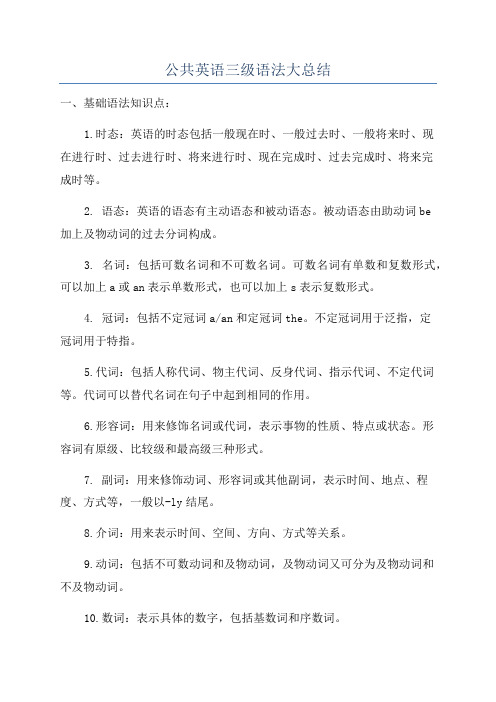
公共英语三级语法大总结一、基础语法知识点:1.时态:英语的时态包括一般现在时、一般过去时、一般将来时、现在进行时、过去进行时、将来进行时、现在完成时、过去完成时、将来完成时等。
2. 语态:英语的语态有主动语态和被动语态。
被动语态由助动词be加上及物动词的过去分词构成。
3. 名词:包括可数名词和不可数名词。
可数名词有单数和复数形式,可以加上a或an表示单数形式,也可以加上s表示复数形式。
4. 冠词:包括不定冠词a/an和定冠词the。
不定冠词用于泛指,定冠词用于特指。
5.代词:包括人称代词、物主代词、反身代词、指示代词、不定代词等。
代词可以替代名词在句子中起到相同的作用。
6.形容词:用来修饰名词或代词,表示事物的性质、特点或状态。
形容词有原级、比较级和最高级三种形式。
7. 副词:用来修饰动词、形容词或其他副词,表示时间、地点、程度、方式等,一般以-ly结尾。
8.介词:用来表示时间、空间、方向、方式等关系。
9.动词:包括不可数动词和及物动词,及物动词又可分为及物动词和不及物动词。
10.数词:表示具体的数字,包括基数词和序数词。
11.简单句:由主语和谓语构成,可以包含宾语、表语、宾语补足语等。
12.并列句:由两个或多个简单句用并列连词连接而成,表示并列关系。
13.复合句:包括主从复合句和连接复合句。
主从复合句由一个主句和一个或多个从句构成,连接复合句由两个或多个从句构成。
14.修饰语从句:修饰一个名词或代词的从句,通常由关系代词或关系副词引导。
15.定语从句:修饰一个名词或代词的从句,通常由关系代词或关系副词引导。
16.状语从句:修饰动词、形容词或副词的从句,通常由连词或连词短语引导。
17.祈使句:表示请求、命令、建议等,一般不指明主语,用动词原形开头。
18.感叹句:表示惊讶、高兴、忧虑等感叹的句子。
19.反意疑问句:用来表示征求对方的同意或确认,一般由一个陈述句和相应的疑问句组成。
二、高级语法结构:1.过去完成时:表示在过去一些时间点之前已经完成的动作或事件。
公共英语等级考试三级复习资料

公共英语等级考试三级复习资料(1)Dialogues 1.Malenie Sanders brings out her photo album to show her new Egyptian friend, Layth, pictures of the family.Background knowledge:1. extended family and nuclear familyExtended family(traditional family): the family usually includes grandparents, parents and children living under the same roof 大家庭Nuclear family(modern family): the family only consists parents and children核心家庭2. the Depression: the Great Depression 经济大萧条(1930-1940)It refers to the difficult period before World War Ⅱin the UnitedStates. Many families faced serious financial or money problems in this period. Language points:1. Who’s that holding the hand of a boyWho’s that girl holding the stick?The one wearing funny hat is my little brother.现在分词短语作后置定语表伴随2.His hat is really out of date.out of date: no longer fashionable 不再流行的,过时的. This kind of hair style is out of date.out-of-date (作定语) 不再流行的,过时的out-of-date hairstyle/ dress/ ideas/ songs/magazinesup to date: fashionable 流行的This kind of hair style is up to date.up-to-date (作定语) 流行的up-to-date hairstyle/ dress/ ideas/ songs/magazines3.He’s wearing boots, because shoes were out of stock.out of stock: not available 没有存货.The book is out of stock.in stock: available有存货The book is in stock.4.He really has an outgoing personality.outgoing personality: 外向的个性outgoing: friendly and sociable 友好的、好交际的、外向的extroverted, 外向的ntroverted, reserved, 内向的5.He really know how to bring a person out.ring sb out:cause sb to lose shyness 使某人克服害羞心理He really knows how to bring a person out.She’s nice — but needs s lot of bringing out.6.I wish I had his social skills.wish 虚拟语气(与现在的情况相反从句用一般过去时,与过去的情况相反从句用过去完成时)I wish I were rich.She wished she had stayed at home.Dialogue 2Mr. Irving, chairman of a new vocational school, is talking with Mrs. Schmidt, theschool’s human resources manager, about qualities needed in their personnel.Some words about people’s personalities:The traits most necessary for interpersonal success: (noun)honesty诚实, dependability依靠性, tolerance容忍、宽容, cooperativeness竞争性, perseverance坚持不懈, vision有远见, competency有能力, fair-mindedness公正, punctuality准时The traits for a desirable director: (adjective)Humble谦卑的, diplomatic有外交手腕的, flexible灵活的, well-educated受过良好教育的,experienced有经验的, concerned关心别人的, generous慷慨的, skillful有技术的,The traits for practical leaders: (adjective)Diligent勤奋的, modest谦虚的, clever聪明的, humble谦卑的Language points:1.According to psychological research, the traits most necessary for interpersonalsuccess are honesty.according to 根据、按照According to English law, he is innocent.According to the Bible, God created the earth in six days.2.In addition to those general assets, our school seek practical leaders who areskillful and diligent.in addition to 除---之外In additional to his salary he earned 1000 dollars.in addition 添加、补充、此外The river sustains many forms of wildlife; in addition, it gives the neighborhood children a good place to swim in.3.We have done good work so far.so far 到目前为止(常与现在完成时连用)We haven’t heard f rom them so far.Monologue OneMonologue about Mary, a store detective.Mary was chosen as a detective because she didn’t look like a detective. This is a story about Mary’s experience. One day she captured a c well-dressed thief who stole three silk ties.Language points:1.Would you mind .letting me take a look in your briefcase.would you mind doing sthThe guest said that they wouldn’t mind having a little light music.Would you mind opening the window?Certainly not.Sorry, you’d better ---.2. She insist on having a look into the man’s briefcase.insisit on doing sthI insisit on your being there.I insist that we (should) go there on foot.insist, suggest, order, demand,propose, require, request, command, decide,等词后面的宾语从句应该使用虚拟语气I suggested that we (should) take part in the game.I command that every should arrive here before 7 o’clock.Monologue TwoMonologue about Jules Verne and his storiesHe based his books on imagination, adventure and science.1.Many of his attempt to look into the future were surprising accurate.look into 调查、了解We’ll look into this matter together.They’ll look into that right away.2.In all his books Jules Verne used his scientific knowledge as well as hisimagination in describing the future inventions.as well as 既------又------,除------之外(还)------The child is lively as well as healthy.He gave me money as well as advice.PassageThe passage talk about the life of Oprah Winfrey’s life. What kind of thecircumstances he was born in ? How did she study? What contributions she did to change the world since 1954.? She was a courageous, funny, compassionate, well-informed, dazzlingly curious person, as down-to-earth as loving as any human being the author have ever known..1.Upon discovering books, the child delved into the written word, turning out weekly book reports for her father.1)Upon/on doing sthUpon/on receiving the letter, I will write back to you.Upon/on arriving home, they will give us a telephone call.2)turn out 生产、制造,最终变成They concentrated their efforts on turning out more products of high quality. The plan turned out failure.3)delve into 钻研2.She was watching the live broadcast of the Academy Award ceremony.1) live broadcast2) the Academy Awards 学院奖,奥斯卡金像奖3.That may also be partly due to the very special energy.due to: caused by sb/sth, because of sb/sthThe team’s success was largely due to her efforts.His lateness was due to the very heavy traffic on the motorway.The flight was cancelled due to the fog.4.down to earth 脚踏实地的公共英语三级考试成绩快速提高方法指点考试时间临近时,通过大批量阅读提高已经不可能了,把握好解题技巧,往往能让同学们锦上添花。
PETS第三级(全国公共英语等级考试)内容介绍

PETS第三级(全国公共英语等级考试)内容介绍第一课〈〈个人情况与人们〉〉•比较流利地向外国人介绍自己和朋友的自然情况,并且就一般话题与外国人进行交谈,向外国人询问并理解上述信息•告诉外国朋友自己的姓名、地址、电话号码、出生点、来自何方、职业、爱好•向外国朋友询问、回答并理解以上信息第二课〈〈家与家人,环境〉〉•就家与家人的话题同外国人进行一般性的交流•用英语向外国人描述自己的房子、家具的摆设、院前屋后的花草•用英语向外国人介绍自己的家人和朋友•用英语向外国人描述自己的居住地区的环境情况或国家的综合环境状况•理解外国人用英语讲述的自己的家人以及自己的国家的环境情况第三课〈〈天气和气候〉〉•用英语和外国人交流本地或中国的天气和气候情况•用英语和外国人交流中国的天气预报情况•理解外国人有关天气状况的般询问•用英语流利地向外国人询问并了解天气状况第四课“饮食〉〉•用英语邀请外国人一起就餐•用英语接受或拒绝外国人一起就餐的邀请•用英语在餐馆接待外国人就餐•用英语与外国人交流饮食方面的信息第五课〈〈闲暇活动〉〉•告诉外国人自己何时有空•告诉外国人自己在兴趣、娱乐、体育、阅读等方面的闲暇活动•询问并理解外国人的上述信息第六课〈(日常生活〉〉•用英语向外国人描述自己在家里的日常活动•用英语向外国人描述自己在单位的日常工作•询问并理解外国人用英语给出的上述信息•在求职或接待求职中能使用井理解上述英语信息第七课〈〈购物〉〉•用英语接待或陪同外国人购物•用英语与外国人交流有关购物方面的信息•用英语向外国人询问并理解以上信息第八课〈〈假日〉〉•用英语向外国人谈论中国的节假日,如新年、春节、中秋节等•用英语谈论西方节假日•用英语向外国人询问并理解以上信息第九课〈〈地方〉〉•听懂外国人用英语问路并用英语给外国人指路•用英语向外国人问路并听懂外国人指路•用英语向外国人询问并理解以上信息第十课〈〈旅游〉〉•用英语帮助来中国旅游的外国人•用英语告诉外国人如何预订机票,在机上寻求帮助,如何通过海关•带领外国人到中国各地旅游并用英语进行讲解•自己到外国观光旅游第十一课〈〈健康〉〉•在医疗岗位上用英语接待外国人看病•听懂和回答外国人用英语描述的身体状况和相关询问•用英语向外国人描述自己或他人的身体状况•用英语在医院看病,认识保健食品,了解有关保持心理健康的知识第十二课〈〈服务〉〉•学到如何在邮局、宾馆、饭店、银行、车站、旅游景点等地用英语为外国人提供服务•同外国人用英语进行以上信息的交流第十三课〈〈商业与货币〉〉•用英语向外国人解释中国银行的各项服务业务•用英语向外国人介绍在中国如何兑换外币•用英语同外国人一起谈论有关投资方面的信息第十四课〈〈工作与职业〉〉•用英语进行日常工作交流•用英语向外国人介绍中国的工作和职业情况•用英语同外国同事交谈有关公司的一些事情•参加中外合资公司组织的英语面试或询问求职方面的信息•用英语回答应聘时的问题第十五课〈〈时事〉〉•用英语及所学过的知识谈论当前中国国内和世界的时事•用英语同外国人交流彼此对时事的观点第十六课〈〈教育〉〉•用英语同外国人交流有关中国教育、学校、学习、课程、考试和教学管理方面的信息•帮助外国学生解决在中国学校学习的一些生活问题第十七课〈〈科普知识〉〉-利用所学知识用英语就某些自然现象、空间技术、地质、地理、医药卫生、动植物知识等内容与外国人进行交谈•正确理解涉及科普知识的英语文章第十八课〈〈历史〉〉•了解本国和英语国家的历史知识,并能用英语进行流利交谈•迅速接受有关历史的或书面信息•准确理解上述相关信息。
公共英语三级知识点
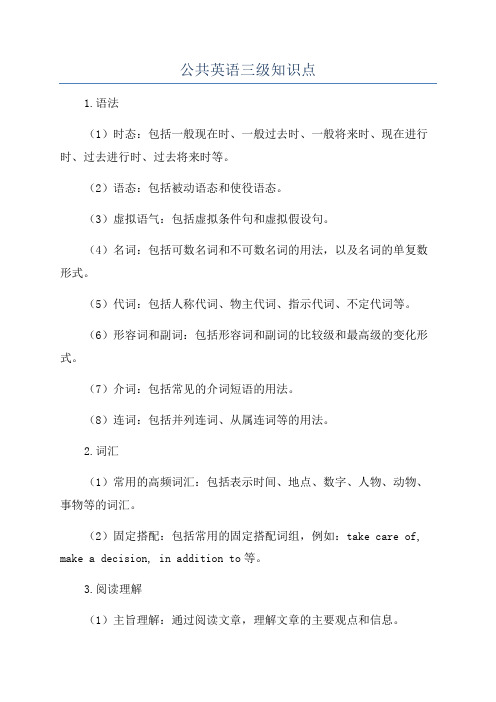
公共英语三级知识点
1.语法
(1)时态:包括一般现在时、一般过去时、一般将来时、现在进行时、过去进行时、过去将来时等。
(2)语态:包括被动语态和使役语态。
(3)虚拟语气:包括虚拟条件句和虚拟假设句。
(4)名词:包括可数名词和不可数名词的用法,以及名词的单复数形式。
(5)代词:包括人称代词、物主代词、指示代词、不定代词等。
(6)形容词和副词:包括形容词和副词的比较级和最高级的变化形式。
(7)介词:包括常见的介词短语的用法。
(8)连词:包括并列连词、从属连词等的用法。
2.词汇
(1)常用的高频词汇:包括表示时间、地点、数字、人物、动物、事物等的词汇。
(2)固定搭配:包括常用的固定搭配词组,例如:take care of, make a decision, in addition to等。
3.阅读理解
(1)主旨理解:通过阅读文章,理解文章的主要观点和信息。
(2)细节理解:通过阅读文章,寻找并理解文章中的细节信息。
(3)推理判断:通过阅读文章,运用逻辑思维推理出正确的答案。
(4)词义猜测:根据文章上下文,推测出词语的含义。
4.写作
(1)个人简介:写作自我介绍,包括姓名、年龄、职业、爱好等。
(2)描写事物:写作对人、地点、事物的描写,包括外貌特征、性格特点、场所环境等。
(3)写作推荐信:写作推荐信,包括介绍被推荐人的基本情况、能力和优势等。
公共英语等级考试三级(PETS-3)大纲词汇

AD.n.公元abandon v.放弃;抛弃,离弃abdomen n.腹;腹部abide v.(by)坚持;遵守;容忍ability n.能力,智能;才能,才干;技能abolish v.废除,取消abroad adv.出国,在国外abrupt adj.突然的;险峻的;(举止,言谈等) 不流畅的absence n.缺席,不在场;缺乏absent adj.(from)缺席的,不在场的;漫不经心的absolute adj.绝对的;完全的;专制的absorb v.吸收;吸引,使专心abstract adj.抽象的;深奥的n.摘要;抽象v.摘要;转移absurd adj.愚蠢的;荒唐的abundant adj.丰富的;充足的abuse v.& n.滥用;谩骂academic adj.学院的;学术的,教学的accelerate v.加速;促进accent n.腔调,口音;重音(符号)accept v.认可,接受access n.接近,进入;入口,通路;接近(或进入) 的方法accident n.事故accidental adj.偶然的,意外的accommodate v.留宿,收容;供应,供给;容纳accommodations n.住宿accompany v.陪伴,陪同accomplish v.完成,实现according to prep.根据account n.账户accumulate v.积累,积蓄;堆积accurate adj.精确的,准确的accuse v.(of)控告,谴责accustom v.(to)使习惯ache v.痛;哀怜n.疼痛,酸痛achieve v.完成,达到;获得acid n.酸adj.酸的;酸性的acquaint v.使认识,使了解acquaintance n.熟人;相识;熟悉acquire v.取得,获得;学到acre n.英亩acrobat n.杂技演员act v.行动;做action n.行动,行为;动作,活动;(on)作用active adj.活动的,活泼的;积极的;敏捷的;剧烈的activity n.活动actual adj.实际的,事实上的;真实的ad(=advertisement)n.广告advertise v.做广告adapt v.(to)(使) 适合;改编,改写add v.加addition n.加,加法;附加物additional adj.附加的,另外的address n.地址adequate adj.足够的,充分的;符合要求的adhere v.(to)粘附;坚持,遵循adjective n.形容词adj.形容词的adjust v.调节,校正;(to)(使)适应administration n.管理,经营;行政(机关,部门);政府admire v.羡慕,赞赏,钦佩admit v.承认adopt v.采用,采纳;收养adult n.成(年)人;成体adj.成年人的;已成熟的advance v.前进;取得进展advanced adj.高级的,先进的advantage n.优点,优势adventure v.大胆进行,拿…冒风险n.冒险;奇遇advice n.忠告;建议advise v.劝告,建议adviser n.(政府,公司等的) 顾问affair n.事,事情,事件affect v.影响,传染;感动affection n.爱,慈爱affirm v.断言;(法庭上) 陈述affirmative adj.肯定的n.(指言语) 表示同意的词语afford v.买得起,担负得起Africa n.非洲African adj.非洲的n.非洲人afterward adv.(-s)后来,以后against prep.反对;与之成对手,对着;防止;碰agency n.经办;媒介;代理处agent n.代理人,代表agony n.苦恼;极大痛苦agreement n.协议,协定;一致,同意agricultural adj.农业的agriculture n.农业,农学ahead adv.在前;向前aid v./n.辅助,援助,救助aim v.把…瞄准,把…对准aircraft n.飞机,航空器airline n.航线;航空公司alarm n.警报;惊恐v.使惊恐,惊动,惊吓;向…报警alcohol n.酒精,乙醇alert adj.警惕的n.警报;警戒状态;警戒期间v.使警觉alike adj.相同的;相像的adv.相同地,一样地alive adj.活着的;存在的;有活力的,活跃的allied adj.联合的;同盟的;同源的allow v.允许ally n.同盟国,同盟者;支持者v.(with)使结盟,结成同盟almost adv.几乎alone adj.独自一人的adv.单独;只有,仅仅along adv.向前;和…一起,一同prep.沿着,顺着alongside prep.在…旁边,横靠adv.并排地,并肩地aloud adv.出声地,大声地already adv.已经alter v.改变,变样alternate adj.交替的;预备的n.代理人v.交替,轮流although conj.虽然;尽管;即使altogether adv.完全,全部地amaze v.认使惊奇,使惊愕,使惊叹ambassador n.大使ambiguous adj.模棱两可的ambition n.雄心,野心ambitious adj.有雄心的,野心勃勃的;劲头十足的ambulance n.救护车;野战医院among prep.在…之中amount n.数量ample adj.充分的,富裕的;宽敞的,宽大的amuse v.逗…笑,给…以娱乐(消遣)amusement n.娱乐,消遣;娱乐活动analysis n.分析,分解analyze(=analyse) v.分析;分解;解析ancient adj.古代的,古老的angel n.天使anger v.使发怒,激怒n.愤怒,气愤angle n.角;角度,观点anniversary n.周年(纪念日)adj.周年的announce v.宣告,宣布annoy v.使恼怒,使生气;打扰,干扰annual adj.每年的,年度的;一年一次的n.年报,年刊ant n.蚂蚁anxiety n.挂念;焦虑;渴望anxious adj.(about)忧虑的,担心的;渴望的apartment n.单元房,套房;公寓apologize(=apologise)v.道歉,认错apology n.道歉,认错apparent adj.(to)明显的,显而易见的;表面的,貌似的appeal v.呼吁,请求;上诉;求助于n.呼吁,请求;上诉appear v.出现appearance n.出现,外表appendix n.附录;附属物appetite n.食欲,胃口;欲望,爱好;要求applaud v.喝彩,鼓掌;称赞application n.请求;申请(书,表);应用,运用apply v.申请appoint v.任命,委任;约定,指定appointment n.约会,预约;任命,选派appreciate v.感谢,感激;正确评价;欣赏,赏识approach v.靠近,接近,临近n.方法,途径;探讨approval n.赞成,同意;认可,批准approve v.(of)赞成;批准,通过apt adj.恰当的,适宜的;(习性) 易于…的,有…倾向的Arabian n.阿拉拍人adj.阿拉伯(人) 的arch n.拱门;弓形结构v.拱起;(使) 成弓形architect n.建筑师;设计师architecture n.建筑(式样,风格);建筑学Arctic adj.北极的,北极区的n.北极, 北极圈area n.地区argue vi.论证,认定;争论,争吵argument n.争论,争吵arise vi.出现;呈现arm n.胳膊army n.军队,军;大群,大批around prep.在…各处,到处;大约adv.约,到处arouse v.唤醒;激起arrange v.整理,排列;安排arrest v.逮捕;扣留;阻止;吸引n.逮捕;扣留arrival n.到达,到来;到达的人或物arrive v.到达arrow n.箭(状物);箭头符号;箭头artificial adj.人工的,人造的;矫揉造作的artist n.美术家;艺术家ash n.灰,灰末ashamed adj.惭愧的,害臊的ashore adv.在岸上;上岸Asia n.亚洲Asian adj.亚洲的;亚洲人的n.亚洲人aside adv.在旁边;到旁边aspect n.样子,外表,面貌;(问题等的) 方面assemble v.集合,集会;装配,组装assembly n.集会,会议;装配assert v.断言,宣称;维护assignment n.分配,委派;任务,(课外)作业assist v.帮助,援助,协助assistance n.帮助,援助assistant n.助理,助手associate v.(with)使联系;交往,结合n.合作人,伙伴,同事,同行adj.合伙的;副的association n.协会,团体;联合,交往;联想assume v.假装;假定,设想;采取,承担assure v.使确信,使放心;保证,担保astonish v.使惊讶;使惊恐Atlantic n.大西洋atmosphere n.大气(层);空气;气氛,环境atom n.原子;微粒attach v.(to)缚上,系上,贴上attack v.攻击,进攻n.攻击,进攻;(病) 发作attain v.达到;获得;完成attempt v.企图,试图n.努力,尝试;企图attend v.出席,参加(会议等);侍候;照料,关心;看管attendant n.服务员,值班员;护理人员adj.在场的;伴随的attention n.注意,留心attentive adj.注意的,留神的attitude n.(to, towards) 态度,看法;姿势attorney n.律师;代理人attract v.吸引n.标准attractive a.有吸引力的;引起注意的attribute v.(to)把…归因于,把…归咎于n.属性,特征audience n.听众,读者;会见aural adj.听觉的author n.著者;创始人authority n.权力;权威者;有权威性的典籍;(pl.)当局auto n.(=automobile)汽车autumn n.秋天available adj.可用的,可得到的;可以见到的,随时可来的avenue n.林荫道,大街;途径,手段average n.平均数v.均分(利益等),平均adj.平均的;通常的avoid v.避免;回避,躲开await v.等候;期待awake adj.醒着的v.唤醒;醒award n.奖(品)v.授予,奖给aware adj.(of)知道的,意识到的awful adj.令人恐惧的;威严的;可怕的;极坏的;糟糕的awfully adv.非常,很awkward adj.笨拙的;棘手的,尴尬的;使用不便的axe(=ax) n.斧子background n.背景backwards adv.&adj.向后地(的), 相反地(的)bacon n.咸猪肉,熏猪肉badminton n.羽毛球baggage n.(美)行李bake v.烘,烤bakery n.面包房;面包糕点店balance n.平衡;余额bald adj.秃的;秃头的balloon n.气球band n.条,带;乐队;波段;一群,一伙v.认缚,绑扎bandage n.绷带v.用绷带扎缚bang n.砰砰的声音;猛击v.砰地关上;猛撞bank n.银行,河岸bankrupt adj.破产的v.使破产n.破产者banner n.旗(帜);横幅barber n.理发师,队理发bare adj.光的,秃的barely adv.赤裸裸地,无遮蔽地;仅仅,勉强bargain n.协定,合同;交易;特价商品v.还价;达成协议bark v.吠叫;咆哮n.吠声,狗叫声barn n.谷仓,仓库;草料房barrel n.桶;枪管,炮管base n.基(础);基地v.(on)把…建立在…基础上basic a. baseball n.棒(垒)球运动;棒(垒)球basement n.地下室,地窖basin n.脸盆,盆;盆地basis n.基础,根据;主干basket n.篮,篓bat n.球拍,球棒;蝙蝠v.用球棒(拍) 打球batch n.一批,一组,一群bathe v.洗澡battery n.电池(组);炮兵连,炮组battle n.战役;战斗bay n.海湾,(港)湾BC(=B.C.) abbr.公元前beach n.海滨,海滩beam n.(横) 梁,桁条;(光线的) 束,柱v.微笑;发光bean n.豆,菜豆,蚕豆bear v.生子女;忍受;负担beard n.(下巴上的)胡须,络腮胡子beast n.兽,牲畜;凶残的人,举止粗鲁的人beat n.(心脏等的) 跳动(声);有节奏的敲击(声)v.(连续地) 打,击;打败,战胜beauty n.美,美丽;美人;美的东西bee n.蜜蜂beef n.牛肉v.抱怨;发牢骚beer n.啤酒beforehand adv.提前地,超前地adj.预先准备好的;提前的beg v.乞讨,乞求;恳求,请求beginner n.初学者beginning n.开始,开端,起点behalf n.利益behave v.举止,表现;运转behaviour(=behavior) n.行为,举止being n.生命;存在,生存belief n.信仰;相信,信念bell n.钟,铃belong v.(to)属于beloved adj.受爱戴的,敬爱的n.爱人,心爱的人below prep.在下面,在下方;…以下,低于…belt n.腰带;长形地带v.系上腰带bench n.长凳,长椅bend n.弯曲(处) v.(使)弯曲beneath prep.在…下边,在…之下adv.在下方,低于benefit n.利益,好处;恩惠v.有益于;(from, by) 受益bent adj.弯曲的;下决心的n.(for)嗜好;倾向beside prep.在…旁边(或附近);和…相比besides adv.而且,还有prep.除…之外bet v.赌,打赌;相信n.打赌,赌注betray v.背叛,出卖;暴露,泄露;辜负beware v.当心,谨防;留神beyond prep.在(或向)…的那边,远于;超出adv.在更远处Bible n.《圣经》bid v.祝愿;命令,吩咐;报价;投标n.出价,投标bill n.账单billion n.(美) 十亿;(英) 万亿bind v.捆,绑,包扎;束缚;凝固biography n.传记birth n.出生,分娩;起源,根源birthplace n.出生地biscuit n.饼干bit n.一点bite v.& n.咬,叮bitter adj.有苦味的;苦的;很冷的blame v.责备;(on, onto) 把…归咎于n.责任;责怪,责备blank adj.空白的;空虚的;失色的,无表情的n.空白blanket n.毯子(可数);厚厚一层(可数)v.铺上一层blast n.一阵(风),一股(气流);爆炸冲击波;管乐器或汽笛声v.爆炸,爆破;摧毁blaze n.火焰;火光;闪光v.燃烧,冒火焰;照耀,发光bleed v.流血;榨取;渗出(from )bless v.祝福,保佑;对(上帝) 感恩blind adj.瞎的,失明的;盲目的v.使失明block n.街区blood n.血,血液bloody adj.流血的;血腥的;残忍的bloom n.花(朵);开花(期)v.开花blossom n.(某一树丛或树上开的) 全部花朵;开花期blouse n.女衬衫,童衫blow v.刮,吹blush v.& n.脸红,羞愧board n.木板boast v.(of, about) 自夸,夸耀n.自夸的话;夸耀的事boat n.船,小船boil v.沸腾boiler n.锅炉;煮器bold adj.大胆的,勇敢的;冒失的;黑体/粗体的;醒目的bomb n.炸弹v.投弹于,轰炸bond n.结合(物),黏结(剂),联结;证券;契约;保证书bone n.骨,骨骼boot n.(长统) 靴;(汽车后部) 行李箱booth n.电话亭;货摊border n.边界,国界;边(沿)v.交界,接壤bosom n.(心)胸;内心bother v.打扰,麻烦;使烦恼,使难受n.麻烦,困难bottle n.瓶子bottom n.底,底部bound v.跳(跃);限制n.跳(跃);界限a.被束缚的;密切关联的boundary n.分界线,边界,国界bow n.弓;鞠躬;点头;蝴蝶结bowl n.碗brain n.脑,脑髓;(pl.)智力brake n.刹车;制动器branch n.树枝,分枝;(机构的) 分部;分支brand n.商标,标记;烙印v.使铭记;打烙印brass n.黄铜;铜器adj.黄铜制的brave adj.勇敢的bravery n.勇敢breast n.胸脯,乳房breath n.呼吸breathe v.breed v.(使) 繁殖;产生,引起;抚养,饲养n.品种,种类brick n.砖,砖状物bride n.新娘、bridegroom n.新郎bridge n.桥brief adj.简洁的;短暂的v.简短介绍,简要汇报bright adj.明亮的,晴朗的;聪敏的,机灵的;欢快的brilliant adj.光辉的,灿烂的;卓越的,才华横溢的n.宝石brisk adj.轻快的;生气勃勃的;兴隆的;清新的brittle adj.易碎的;脆(弱) 的;冷淡的broad adj.宽的,广阔的;豁达的adv.宽阔地,广阔地broadcast v.广播,播送n.广播,播音brook n.小河,溪v.忍受,容让broom n.扫帚brow n.额头;眉毛,眉脊brown adj.棕色的n.棕色brush n.刷子,毛刷;画笔v.刷,擦brutal adj.残忍的;兽性的;严酷的bubble n.泡,水泡,气泡v.冒泡,起泡bucket n.水桶;一桶之量bud v.发芽,含苞欲放n.芽,花苞budget n.预算v.做预算,安排adj.合算的buffet n.(火车站或火车餐车上的)饮食柜台;餐台bulb n.灯泡,球状物;球茎bull n.公牛;雄象(鲸等);像公牛一样的人;金牛座adj.公牛般的;大型的;雄的bullet n.子弹bulletin n.公报,告示,新闻简报bunch n.(一) 簇,束,捆,串bundle n.捆,包,束burden n.担子,负担;装载量bureau n.署,局,司,处;大书桌,写字台burn v.烧(掉),烧毁;烧焦n.灼伤;烧伤处burst v.爆裂;突然发生/发作n.突然破裂;爆发;一阵bury v.埋葬,葬;掩埋,埋藏bush n.灌木butcher n.屠夫,卖肉者butter n.黄油v.涂黄油butterfly n.蝴蝶;轻浮的人button n.钮扣;按钮(开关)v.扣紧cabbage n.卷心菜,洋白菜cabin n.客舱,机舱;小(木) 屋cabinet n.橱柜;内阁cable n.电缆cafe n.咖啡馆cafeteria n.自助食堂,自助餐馆cage n.笼v.关在笼子里cal abbr.卡,小卡(small calorie)calculate v.计算,推算,核算;计划,打算calendar n.日历,月历,历法calm adj.平静的,安静的camel n.骆驼camera n.照相机,摄影机camp n.野营;营地v.设营,宿营campaign n.战役;运动campus n.校园canal n.运河;(沟) 渠cancel v.取消,作废;删去cancer n.癌症;肿瘤candidate n.候选人,候补者;报考者;申请者candle n.蜡烛candy n.糖果;蜜饯cannon n.大炮,火炮v.开炮;碰撞canoe n.独木舟,小游艇v.划独木舟cap n.便帽,军帽;(笔、瓶等的) 盖套v.覆盖于…顶端capable adj.能干的,有能力的capacity v.容量,容积;才能,能力;接受力capital n.首都captain n.上尉,队长;船长capture n.捕获,俘获v.夺得,占领;捕获,俘虏career n.生涯,经历;专业,职业cargo n.船货,货物carpet n.地毯;像地毯般的一层东西carriage n.(四轮) 马车;(火车的) 客车厢carrot n.胡萝卜cart n.大车,板车,手推车v.用大车运走cartoon n.漫画,幽默画;动画片v.画漫画carve v.(雕) 刻case n.情况,情形,事实;案件,案情;病例cash n.现金,现款,现钱v.兑现,兑付cashier n.(银行、商店等的)出纳员cassette n.小盒子;盒式磁带cast v.投,抛;铸造;计算n.演员表;一掷;模型;性格castle n.城堡casual adj.偶然的;临时的,非正式的;不拘礼的,随便的casualty n.伤亡人员;受害人;重大伤亡事故catalogue(catalog) n.目录category n.种类,类别;范畴cathedral n.大教堂;(教区内的) 总教堂Catholic n.天主教教徒adj.天主教的cattle n.牛;牲口,家畜cause n.原因,理由;事业,(奋斗的) 目标v.引起caution n.小心,谨慎;警告,告诫v.警告cautious adj.(of)小心的,谨慎的cave n.山洞,洞穴v.塌陷;(业余爱好) 探洞cease v.& n.停止,中止ceiling n.天花板celebrate v.庆祝;庆贺cell n.细胞;小囚房;蜂房;电池cellar n.地窖,地下室cement n.水泥;胶泥,胶接剂v.胶合;巩固,加强cent n.美分,分币center(=centre)n.中心,中央;中心区,核心;中心人物central adj.中心的,中央的,中部的;中枢的ceremony n.典礼,仪式;礼节,礼仪certain adj.确凿的,无疑的;某一;一些certainly adv.一定,无疑;是的,当然,好certainty n.必然,肯定;必然的事certificate n.证书;证明;执照chain n.链,链条;一连串;连锁v.用链条拴住chairman n.主席chalk v.用粉笔写或画n.白垩;粉笔challenge n.挑战(书);艰巨任务v.挑战;要求比试chamber n.房间,室champion n.冠军,得胜者;战士adj.最好的;优胜的chancellor n.首相;大臣;司法官change n.零钱v./n.变化,改变changeable adj.变化的channel n.海峡,水道;频道,波段chaos n.混乱,无序,浑沌chapter n.章character n.性格characteristic adj.特有的,独特的n.特性,特征characterize v.(=characterise)表示…的特性,描述…特征;刻画…的性格charge v.收费,索价n.费用,价格charm n.吸引力,魅力;美貌,风韵v.迷人,(使) 陶醉cha rming adj.迷人的,可爱的chart n.图,图表;最畅销品目录(常用复数)chase v.& n.追逐,追求;寻觅chat v./n.闲谈,聊天cheap adj.便宜的cheat v.欺骗;作弊n.骗子;欺骗行为check v./n.检查;核对n.支票cheek n.面颊cheer v.(使) 振奋;(使) 高兴;喝彩n.振奋;欢呼,喝彩cheese n.乳酪,干酪chemical adj.化学的n.(pl.)化学制品,化学药chemist n.化学家;药剂师chemistry n.化学;人际感情cherish v.珍爱;怀有cherry n.樱桃(树)chest n.胸部,胸腔;柜子,橱chew v.咀嚼;思量chief adj.首要的,主要的n.首领,领袖childhood n.幼年,童年childish adj.孩子气的,幼稚的chill n.寒冷,寒战;寒心v.(使) 寒冷chimney n.烟囱,烟筒chin n.下巴,颏chip n.切屑,碎片;(土豆等的)薄片;集成电路块v.碎裂;削下碎片chocolate n.巧克力choice n.选择,抉择;供选择的东西adj.上等的,精选的choose v.选择chorus n.合唱队;合唱v.异口同声地说,随声附和Christian n.基督教徒adj.基督教的church n.教堂cigar n.雪茄烟cigarette(=cigaret) n.香烟circle n.圆圈,圆,圆周;集团;周期,循环v.转圈,盘旋circular adj.圆(形) 的,环形的;循环的n.传单,通报circulate v.(使) 循环;(使) 流通circumstance n.(pl.)情况,形势,环境;经济情况,境遇circus n.马戏团,杂技团;马戏场,杂技场;马戏表演cite v.引用,引证,举例citizen n.公民,市民,平民civil adj.办公民的,市民的;国内的,民间的;有礼貌的civilization(=civilisation) n.文明civilize(=civilise) v.使文明,开化;开导claim v.要求;声称,主张;索赔;认领n.主张,断言;索赔要求;要求权,所有权clap v.鼓掌,拍手n.鼓掌;霹雳声clarify v.使澄清,使纯净;阐明,使清楚clasp n.扣/钩子;握手;拥抱v.扣/住;紧握/抱classic n.(pl.)经典作品,名著adj.一流的,不朽的;古典的classical adj.古典的classify v.分类(法),分等(级)clay n.黏土,泥土,陶土clean adj.清洁的,干净的v.队把…弄干净,除去…的污垢clear adj.清澈的,清楚的,清晰的,明亮的clerk n.工作人员;职员clever adj.聪明的,机灵的client n.顾客;(诉讼) 委托人;病人cliff n.悬崖;峭壁climate n.气候;风气climax n.顶点,高潮climb v.& n.攀登,爬cling v.(to)粘住;依附;坚持clinic n.诊所,门诊所;临床讲课,临诊课cloak n.斗篷;借口v.掩盖,掩饰cloth n.布,织物,衣料;(一块) 抹布clothes n.衣服clothing n.(总称) 衣服,衣着clue n.线索,提示clutch v.抓住,攫住;掌握n.爪子;毒手coach n.(铁路) 客车,长途汽车;教练v.辅导,训练coarse adj.粗糙的,粗劣的;粗鲁的,粗俗的coast n.海岸cock n.公鸡;龙头,旋塞v.竖起,翘起;使向上code n.代码coherent adj.黏附的;连贯的coil v.卷,盘绕民(一) 卷,(一) 圈;线圈;盘管coin v.铸造;创造(词语) n.硬币,货币coincide v.和…一致,相符,相同coke n.焦炭collaborate v.协作,合作collapse v.& n.倒坍,崩溃;垮台collar n.衣领v.抓住;握住colleague n.同事,同僚collect v.收集collection n.收集物;收藏collective n.集体adj.集体的;共同的college n.学院collision n.碰撞,冲突colonial adj.殖民(地) 的n.殖民地居民colony n.殖民地;侨民群体column n.圆柱,柱;列;(报刊中的) 专栏comb n.梳子v.梳理combat v.& n.战斗,反对,格斗combination n.结合,联合,合并;化合(物)combine v.(with)(使) 结合,联合;(使) 化合comedy n.喜剧;喜剧性事件comfort n.安慰;舒适v.使舒适;安慰comfortable adj.舒适的,舒服的command n.命令,指令;统帅,指挥(权)v.命令;指挥commend v.表扬,称赞;推荐;委托comment n.注释;,评论,意见v.(on)注释;评论commerce n.商业,贸易commercial adj.商业/的n.(广播或电视上推销商品的)商业广告节目commission n.委员会;委任,委托(书),代办;佣金,手续费committee n.委员会commit v.把…交托给;犯错误,干坏事commodity n.商品,物品common adj.共同的commonwealth n.共和国,联邦,共同体communicate vi.交流vt.传染;传播communication n.交流communism n.共产主义communist n.共产主义者,共产党人adj.共产主义的;共产党的community n.社会,社区;共同体;公众commute v.乘车(或船等) 往返于两地companion n.伴侣,同伴,志趣相投的人comparable adj.(with, to) 比得上的,相似的comparative adj.比较的,相当的n.匹敌物;比较级compare v.比较,对照comparison n.比较,对照;比拟compartment n.卧车包房,(客车厢内的) 隔间;分隔的空间;水密舱compass n.罗盘,指南针;(pl.)圆规;(正式) 范围compel v.强迫,迫使compensate v.(for)补偿,赔偿compensation n.补偿,赔偿compete v.比赛;竞争competition n.竞赛,竞争competitor n.竞争者,敌手competent adj.有能力的,胜任的;应该做的,被许可的;足够的;有法定资格的complain v.抱怨;申诉complaint n.抱怨;申诉;疾病complement v.补充,补足民补足n.补充;补语complete adj.完整的,完全的;完成的v.完成,使完整complex adj.复杂的;合成的,综合的n.复杂;联合体complicate v.(使) 变复杂complicated adj.错综复杂的,麻烦的,难解的compliment n.(pl.)问候,致意;称赞,恭维v.称赞,恭维comply v.遵照,应允component n.组成部分,成分,元件adj.组成的,合成的compose v.组成,构成;创作(作曲、诗歌等)composition n.作文,写作;乐曲;构成,组成,结构compound n.混合物,化合物adj.混合的,化合的,复合的v.使复合,使混合;和解,妥comprehend v.理解;包含comprehension n.理解comprehensive adj.内容广泛的,综合的;理解的compress v.压缩,浓缩comprise v.包含,构成compromise v.妥协;折衷compulsory adj.强制的,义务的,必修的compute n.计算,估计comrade n.同志,同事conceal v.隐藏,隐瞒;隐蔽concentrate v.(on)集中,专心;浓缩n.浓缩物concept n.概念,观念;思想concern v.涉及,关系到;(使) 担心,(使) 关切n.关心,挂念;(利害) 关系concerning prep.关于concert n.音乐会,演奏会;一齐,一致concession n.迁就,让步concise adj.简明的,简洁的conclude v.结束,终止;断定,下结论;缔结,议定conclusion n.结束,终结;结论,推论concrete adj.具体的,实质性的n.混凝土;具体物v.浇混凝土condemn v.谴责,指责;判刑,宣告有罪condition vt.使习惯;训练n.条件conditional adj.有条件的conduct n.行为,品行,表现v.引导,指挥;导电,传热conductor n.售票员confer v.商谈,商议;授予,赋予conference n.会议,讨论会confess v.承认,坦白;忏悔confidence n.信心,自信;秘密,机密confident adj.确信的confidential adj.秘密的;亲信的confine v.限制,局限于;管制,禁闭confirm v.使更坚固,使更坚定;证实;确认,批准conflict n.斗争;冲突,分歧v.(with)抵触,冲突conform v.(to)遵守,依照;顺应confront v.(使) 面临,(使) 遭遇;面对confuse v.使混乱,混淆congratulate v.祝贺,致祝贺词congratulation n.祝贺congress n.(代表) 大会;国会,议会connect v.连接,联系connection n.(=connexion)联系;连接;连接点,连接物conquer v.征服,占领;克服,破除conquest n.征服,攻克conscience n.良心,良知conscious adj.(of)意识到的,自觉的;有意识的consent v.& n.同意,赞成consequence n.结果,影响;重要性consequently adv.因而,所以conservation n.保存,保护;守恒conservative adj.保守的,守旧的n.保守主义者consider v.考虑;认为considerable adj.相当可观的;值得考虑的considerate adj.考虑周到的,体谅的consideration n.需要考虑的事,理由;考虑;体谅,照顾consist v.在于,存在于;由…组成consistent adj.前后一致的,始终如一的consolidate v.巩固,加强;统一,合并conspicuous adj.明显的,惹人注目的constant a.经常的,不断的;永恒的;忠实的n.常数,恒量constitution n.构成,组成,成分;体格;宪法;建立construct v.建设,建造,构造;创立;编写construction n.建设;建筑(物)consult v.(与…) 商量,请教;查阅consultant n.会诊医师;顾问;协商者consume v.消费contact vt.联系contain v.包含,含有,容纳container n.容器,集装箱contemporary adj.现代的,当代的;同时代的contend v.竞争,斗争;坚决主张;争论content n.内容contest v.& n.竞争,竞赛,比赛context n.上下文,语境,环境,背景continent n.大陆,洲continual adj.不断的,连续的,频繁的continue v.继续,延伸continuous adj.连续的,持续的contract n.契约,合同;包工v.缩小,缩短;订(约) contrary adj.相反的,矛盾的,对抗的n.反对,矛盾;相反contrast v.对比,对照对照,对比;差异contribute v.贡献,捐助;投稿control v.& n.控制,支配;克制,抑制controversial adj.争论的;爱争论的;引起争论的convenience n.便利,方便;公共厕所convenient adj.方便的,舒适的convention n.大会;惯例,习俗;公约,协定conversation n.会话,闲谈convict v.判罪n.囚犯,罪犯conviction n.确信,定罪convince v.使信服,使确信cook v.烹调,煮,做饭等n.厨师,炊事员cooperate v.合作,协作,相配合cooperation n.合作coordinate adj.同等的,并列的;坐标的n.坐标v.整理cope v.竞争,对抗;应付,妥善处理n.遮盖物copper n.铜;铜币,铜制品adj.铜制的core n.果核;中心corn n.谷物,小麦;玉米corner n.角;隅;街角;墙角corporation n.公司,企业;团体correct adj.正确的,无误的;正常的,恰当的v.改正correspond v.通信;符合,一致;相当于,对应correspondence n.通信,信件;符合,一致;相当,对应correspondent n.记者,通讯员;通信者;对应物corresponding adj.符合的,相应的,对应的corridor n.走廊,通路,回廊corrupt v.贿赂,收买adj.腐化的,贪污的cost v.花费,值n.价钱,费用costly a.昂贵的,豪华的cottage n.小屋,农舍cotton n.棉,棉花;棉线,棉纱couch n.睡椅,长沙发椅v.(用词语) 表达cough v.& n.咳嗽could aux.&v.可以,能,可能council n.理事会,委员会counsel v.劝告,商议n.忠告,商议;法律顾问,辩护人count v.数counter n.柜台country n.国家;农村countryside n.农村,田野,乡下county n.郡,县couple n.夫妻;一对courage n.勇气,胆识course n.过程court n.法院,法庭;宫廷;院子;球场courtyard n.院子cousin n.堂(或表) 兄弟;堂(或表) 姐妹cover v.盖,包,掩盖n.盖子,罩,套子;封面cow n.母牛,奶牛coward n.懦夫,胆怯者adj.胆小的crack n.裂纹;破裂声,爆裂声;猛击v.(使) 破裂,砸开;(使) 发出爆裂声cradle n.摇篮;发源地craft n.工艺,手艺;技巧;飞机,船,航空器crane n.起重机;鹤v.伸长…看crash v.碰撞,坠落;摔坏n.坠落;撞坏;瓦解;撞击声crawl v.爬行;缓慢(地) 行进n.爬行;缓慢(的) 行进;自由式游泳crazy adj.疯狂的;蠢的cream n.奶油create v.创造,创作;引起,产生;建立creature n.人,动物;生物credit n.信用,信誉creep v.爬行;蔓延crew n.全体船员(乘务员)crime n.罪行;犯罪criminal n.罪犯adj.犯罪的,刑事上的crisis n.(pl.crises)危机,紧要关头;转折点crisp adj.脆的,易碎的n.油炸马铃薯片criterion(pl.criteria)n.标准,准则critical adj.批评的,评论(性) 的;危急的,紧要的criticism n.批评,评论criticize v.(=criticise)批评,批判,指责;评论crop n.农作物,庄稼cross v.穿过,越过;(使) 交叉,(使) 相交n.十字形crossing n.横渡;交叉点,十字路口;人行道crowd n.人群;群众v.拥挤;挤满crown n.王冠,冕;君权v.为…加冕;立…为王crucial adj.至关重要的,决定性的crude adj.天然的,未加工的;生的;粗野的cruel adj.残酷的,残忍的crush v.辗碎,压坏;压服,压倒;拥抱crystal n.水晶,水晶饰品;结晶,晶体adj.水晶的,晶体的cube n.立方形,立方体;立方,三次幂cucumber n.黄瓜cue n.暗示;信号;榜样cultivate v.耕作,栽培,养殖;培养,教养culture n.修养,教养;文化,文明cunning n.& adj.狡猾(的),狡诈(的)cupboard n.碗柜;橱柜cure v.治疗,治好;纠正,矫正n.疗,治愈;疗法,良药curious adj.好奇的curl v.(使) 卷曲,卷缩n.卷发,卷毛;卷曲状,卷曲物currency n.(一国通用的)货币current adj.时下的,当今的;通用的,流通的curriculum(pl.curricula) n.课程,(学校等的)全部课程curse n.诅咒;咒语v.诅咒,咒骂curtain n.窗帘,幕布curve n.曲线;弯曲(物)v.弄弯,成曲形cushion n.垫子custom n.风俗,习惯,惯例;(复) 海关,关税customer n.顾客cycle n.自行车;循环v.骑自行车;循环daily adj.每日的,日常的dairy n.牛奶场,奶店dam n.水坝,水闸damage v.使受损害,毁坏n.(声.)损害;赔偿费damp adj.潮湿的,微湿的n.潮湿,湿气danger n.危险,威胁dangerous a.dare v.敢,竟敢;向…挑战darling n.心爱的人,宠儿adj.心爱的,宠爱的dart n.标枪;镖;投镖游戏;突进v.投掷;发射;急冲,突进dash v.冲,猛冲;突进n.破折号;冲,猛冲;突进datum(pl.data)n.数据,资料;论据dawn v.破晓,(天) 亮起来n.黎明,天亮,曙光daylight n.日光;白昼,黎明daytime n.白天,日间dead adj.死的;无感觉的dying adj.垂死的,临终的death n.死,死亡die v.死亡,去世deadline n.最后期限deadly adj.致命的;不共戴天的deaf adj.聋的;不愿听的deal n.交易v.给予,分给;交易dealer n.商人,贩子debate v.& n.争论,讨论debt n.债务,欠款decade n.十年;一组(十个)decay v.& n.腐烂;衰减deceit n.欺骗(行为)deceive v.欺骗,蒙蔽,诓骗decide v.决定;下决心decided a.决定了的;明确的;果断的decision n.决定decimal adj.小数的,十进制的n.小数deck n.甲板;层面declaration n.宣言;宣布,声明declare v.断言,宣称;声明,宣布,宣告decline n.谢绝;下降,衰落;斜面,倾斜v.下降,下垂,衰落;倾斜;拒绝,谢绝decorate v.装饰,装潢;布置decrease v.& n.减少,减小dedicate v.(to)奉献;专注于deduce v.演绎,推断,推论deed n.行为,行动;功绩;契约deem v.认为;相信deep adj.深的;深切的adv.深深地deer n.鹿defeat v.& n.战胜,挫败,击败defect n.缺点,缺陷defend v.保卫,防守;辩护defense(=defence) n.防御deficit n.亏损,赤字,逆差definite adj.明确的degree n.(角或温度的)度数;等级;程度;学位delay v.& n.推迟;耽搁,延误delegation n.代表团delicious adj.甘美的,可口的,好吃的,芬芳的delight v.(使) 高兴,(使) 欣喜n.高兴,快乐,喜悦deliver v.送交,递送;释放,解救;作(讲演),表达;接生demand v.要求,强令;需要;询问,查问n.要求;需要,需求(量)democracy n.民主(制);民主国家democratic adj.民主(主义) 的demonstrate v.论证,证实;演示,说明;示威denial n.否认;拒绝dense adj.(烟、雾等) 浓厚的,密集的,稠密的density n.密集;密度,浓度dentist n.牙科医生deny v.否认,否定;拒绝depart v.离开,启程;违反;去世department n.部门departure n.离开,启程depend v.(on, upon) 依靠,依赖;信赖,相信;决定于,视…而定deposit v.存放, 储存n.存款depth n.深度,厚度;(感情的) 深厚,深切depth n.深度,厚度;(感情的) 深厚,深切deputy n.代理人,代表adj.副的;代理的deputy n.代理人,代表adj.副的;代理的derive v.取得,导出,起源derive v.取得,导出,起源descend v.下来,下降describe v.形容,描写description n.描述,描绘,形容desert n.沙漠,不毛之地v.离弃,抛弃;擅离,开小差desert n.沙漠,不毛之地v.离弃,抛弃;擅离,开小差deserve v.应受,应得,值得design v./n.设计desirable adj.称心的,期望得到的desire v.愿望,渴望;要求n.愿望,欲望despair v.& n.绝望(from )desperate adj.绝望的;不顾一切的,铤而走险的despise v.看不起,轻视,鄙视despite prep.不管,不顾;尽管n.憎恨,轻蔑dessert n.正餐后的水果或甜食destination n.目的地,终点destiny n.命运;天数destroy v.破坏,摧毁;消灭,扑灭;打破,粉碎destruction n.破坏,消灭detach v.分开,拆开,卸下detail v.详细讲述,详谈n.详细的情况,细节;枝节,琐碎detain v.耽搁,延误;扣留detective n.侦探adj.侦探的;探测的determine v.决定;确定;测定develop v.发展development n.发展;开发;生长,进化device n.装置,设备,仪表;方法,设计devise v.设计,发明;计划devote v.(to)将…奉献(给);把…专用于,致力于dew n.露水diagram n.图解,图表,简图dial n.钟(表) 面;刻度盘;拨号盘v.拨号,打电话dialogue n.对话diameter n.直径diamond n.金刚石,钻石;菱形diary n.日记簿,日记dictate v.口授,(使) 听写;命令dictation n.口授笔录,听写;命令dictator n.独裁者;口述者diet n.饮食,食物differ v.(from)与…不同;(with)与…意见不同difference n.区别different a.不同的difficult adj.困难的;难的difficulty n.digest v.消化,吸收;理解n.摘要,文摘digital adj.数字的;手指的dignity n.庄严,端庄;尊贵,高贵diligent adj.勤奋的,用功的dim adj.暗淡的,模糊的v.(使)暗淡,(使)模糊dine v.吃饭,进餐dining-room n.餐厅dinner n.正餐dip v.浸,蘸diploma n.毕业文凭,学位证书diplomatic adj.外交的,策略的,有手腕的direct adj.直的;率直的adv.直接地;坦率地v.(to, at)把…对准,针对;管理,指导direction n.方向;方位directly adv.直接地,径直地;马上,立即director n.导演dirty adj.肮脏的;下流的,黄色的v.弄脏,玷污disadvantage n.不便,不利条件;损害disagree v.(with)意见不同;不一致,不同意disappear v.消失,失踪disappoint v.使失望,使扫兴disaster n.灾难,天灾disc(=disk)n.圆盘,圆面,盘状物discard v.丢弃,抛弃discharge n.卸货,解除;排出,发射;解雇v.排出,发射;释放,遣散discipline n.纪律;学科;训练v.训练,训导discount v.& n.折扣discover v.发现;暴露,显示discovery n.发现discuss v.讨论discussion n.讨论,谈论disease n.疾病disguise n.伪装物v.假装,伪装disgust n.厌恶,恶心v.使厌恶,使作呕dish n.碟,盘;菜肴,一盘菜dislike v.& n.不喜欢,厌恶dismay n.惊恐,惊愕;失望,绝望;沮丧v.惊恐,使惊愕;使失望,使绝望dismiss v.免职,解雇,开除;解散disorder n.混乱,骚乱;疾病dispatch v.(=despatch)派遣,调遣;发送n.急件,快信;新闻报道;调度displace v.移置,转移;取代,置换display v.& n.陈列,展览,显示displease v.使不快,使生气dispose v.(of)去掉,丢掉,销毁,处理dispute v.& n.争论,争执distance n.距离distant adj.在远处的,远隔的;久远的distinct adj.清楚的,明显的;截然不同的,独特的。
- 1、下载文档前请自行甄别文档内容的完整性,平台不提供额外的编辑、内容补充、找答案等附加服务。
- 2、"仅部分预览"的文档,不可在线预览部分如存在完整性等问题,可反馈申请退款(可完整预览的文档不适用该条件!)。
- 3、如文档侵犯您的权益,请联系客服反馈,我们会尽快为您处理(人工客服工作时间:9:00-18:30)。
PETS 3 一些必要知识点:
倒装句:
全部倒装:通常只用于一般现在时与一般过去时。
1. 在there be或者There live(stand, appear, seem, remain, exist….) 句型中
There are two apples on the desk. (原语序:Two apples are there on the desk) 桌上有两个苹果。
There stands a tall man at the gate. (A tall man stands there at the gate) 一个高个男人站在大门口。
2.在“here, there, now, thus, then+动词+主语”的句子中,(谓语动词为be, go, come, lie, run等,主语为名词)
Here comes the bus. 巴士来了
Now comes my turn. 到我了。
3.“out\ in, up\ down, off\away, in the distance, on the hill, round the corner”等表示方向性的副词或表示地点的介词词组位于句首,且主语又是名词时,句子全部倒装
Down fell the leaves. 树叶落下了。
Away went the team. 全队都走了。
☆注意:主语必须是名词,非名词则不倒装
Here comes the boy. = Here he comes. 他来了
4.有时为了强调表语,构成“表语+连系动词+主语”结构
Lucky is she who survived the massacre. = She who survived the massacre is lucky. 她能从大屠杀中活下来非常幸运。
5、在某些表示愿望的祝愿语中,全倒装
Long may the Queen reign! 愿女王统治长久!
二、部分倒装
部分倒装是指将谓语的一部分如助动词或情态倒装至主语之前
如果句中的谓语没有助动词或情态动词,则需添加助动词do, does或did,并将其置于主语之前。
引导部分倒装的词有:
1. 含有否定或半否定意义的词语:not, neve r, seldom, hardly, little, scarcely, barely, few…Never have I heard of him before. = I have never heard of him before. 我从没听说过他。
2. 含有否定结构的连词: not only…but also., neither. Nor.., no sooner, scarcely...than..., Hardly had ...when..., not until...; nowhere等.
Not only can he play tennis, but also can I. 不只他会打网球,我也会打。
3. 表否定意义的介词词组:by no means, in no case\way, with no method, at no time, on no account, under no circumstances\condition...
In no way will he betray me. 他绝不会背叛我。
注意:
1) Not only...but also...必须连接两个分句时,才使用部分倒装,而且只倒装not only后的分句。
如果连接的是两个并列词语,不用倒装结构
He impressed not only you, but also me. 不仅是你对他印象深刻,我也是。
2) Hardly...when..., Scarcely...than..., No sooner...than...意义基本相同,它们连接的句子,都只倒装前一个分句,即:“前倒后不倒(装)”
Hardly had I closed the door when the dog started to bark. 我一关门,狗就开始叫。
3) 当not until(直到。
才)引导主从复合句时,主句倒装,从句不用倒装,或者可以理解为:“后倒前不倒(装)”
Not until midnight did we finish the work. 直到午夜,我们才完成工作。
2. only+副词/介词短语/状语从句时,主句倒装
Only yesterday did I notice that my fridge was broken. 昨天我才发现我的冰箱坏了。
Only in this way can you learn the lesson. 只有这样你才能吸取教训。
Only when it begins to snow did they light the fireplace. 下雪了他们才开始用壁炉。
3. so用在句首
表示另一主语“也……样”时,用“So + be(have,助动词或情态动词)+主语”结构
而表示另一主语“也不……样”时,用“Nor\Neither + be(have,助动词或情态动词)+主语”结构He forgot the keys, so did I. 他忘了带钥匙,我也是。
He hasn't finished his homework, and nor have I. 他还没做完作业,我也是。
4. as作“尽管/虽然”,引导让步状语从句(as可以换成though),由于语法需要,需要部分倒装
Fun as the job is, I can't be a waitress forever. 虽然工作很有趣,但我不能当一辈子服务员。
注意:though位于句首引导让步状语从句时,可以倒装,也可以不倒装
但as引导让步状语从句时,必须使用倒装。
否则就变成了原因状语从句。
As he is too young, he couldn't go to school. 他还不能上学,因为他还太小了。
5. 在”so…that…“和“such…that…“引导的结果状语从句中,当so和such位于句首时,用“so\such + ... +部分谓语+ 主语+...”
So cold was the weather that I was going to call sick. 之前天气太冷了,我都打算请病假不上班了。
6. 若if引导的虚拟条件句中有were, had, should时, 可将if省略,把were, had , should 放在句首
Should anyone of you hide Mr. Potter, you would be considered as equally guilty.
= If anyone of you should hide Mr. Potter, you would be considered as equally guilty. 你们谁要是敢把哈利波特藏起来,都会当与他同罪对待。
